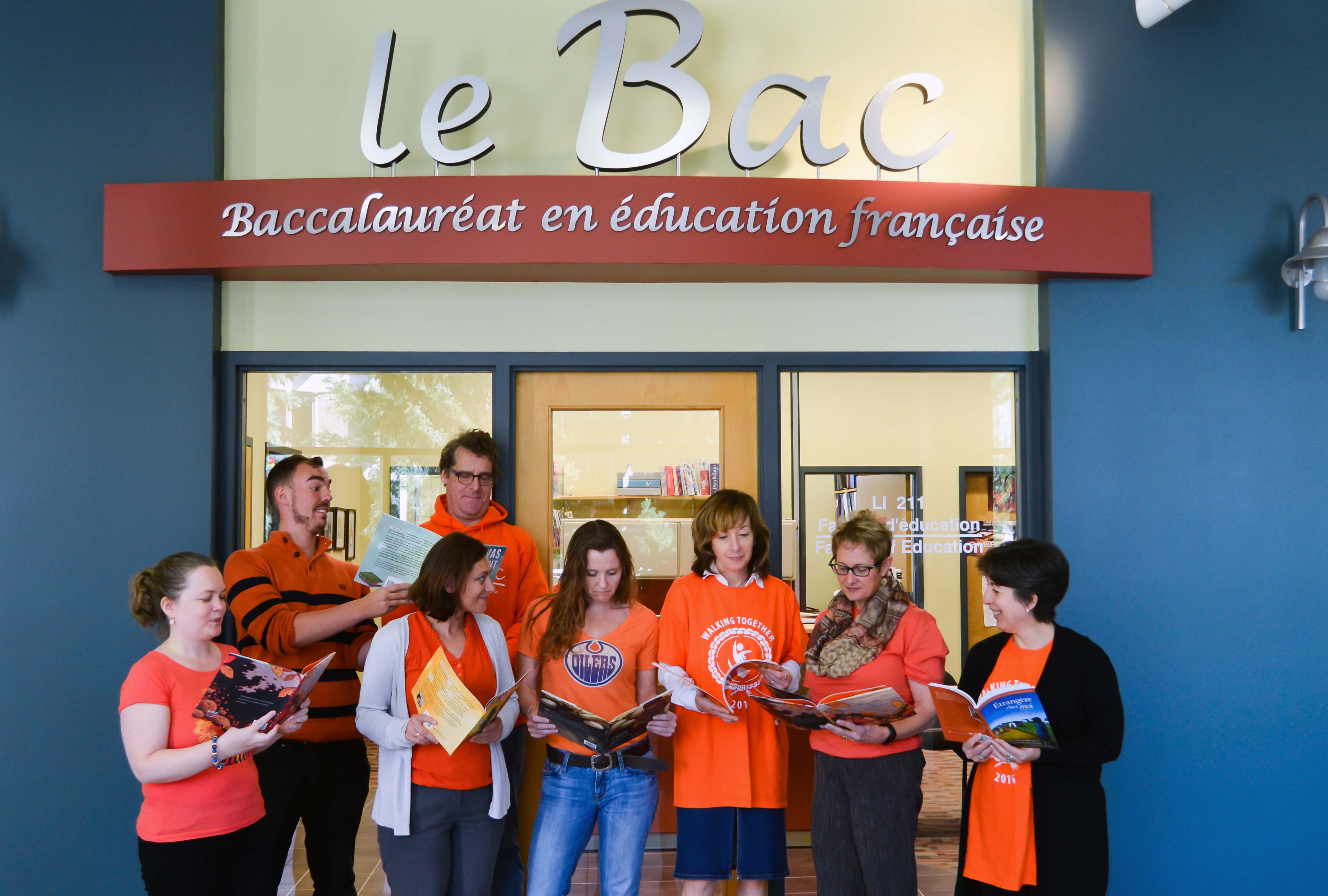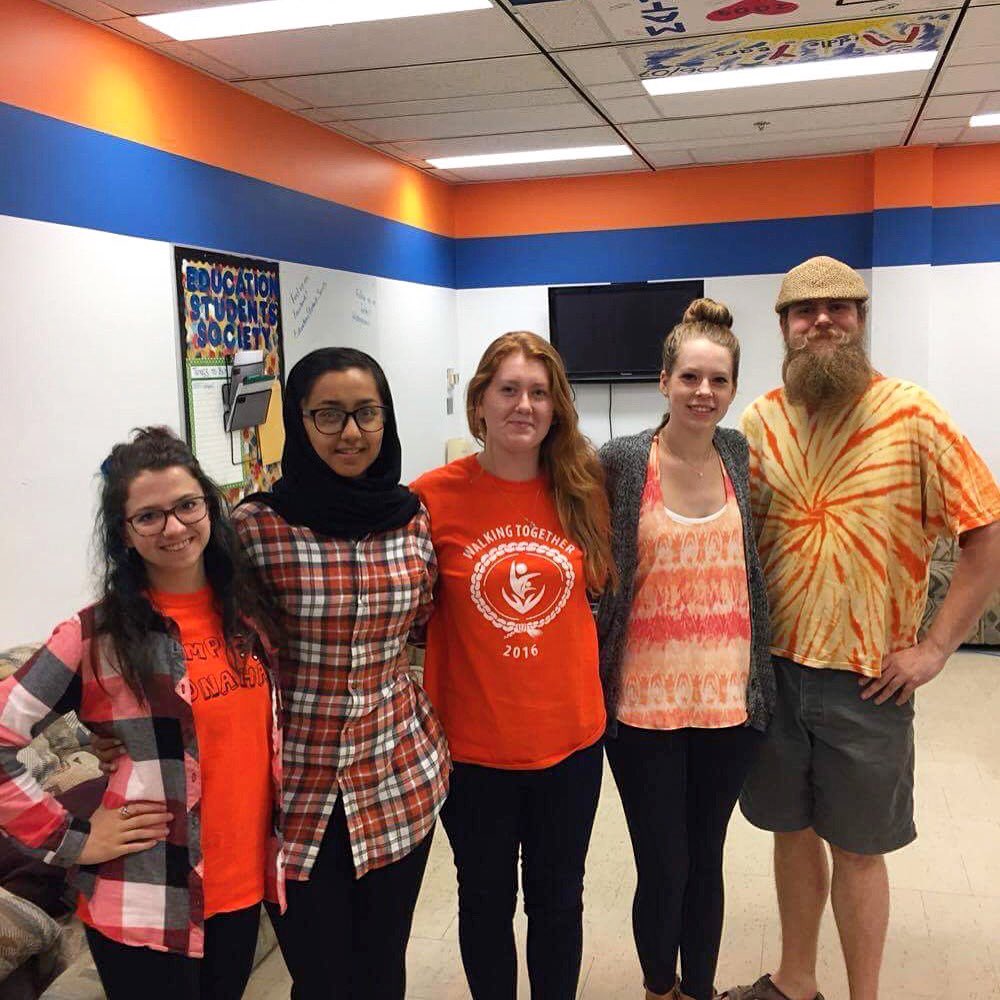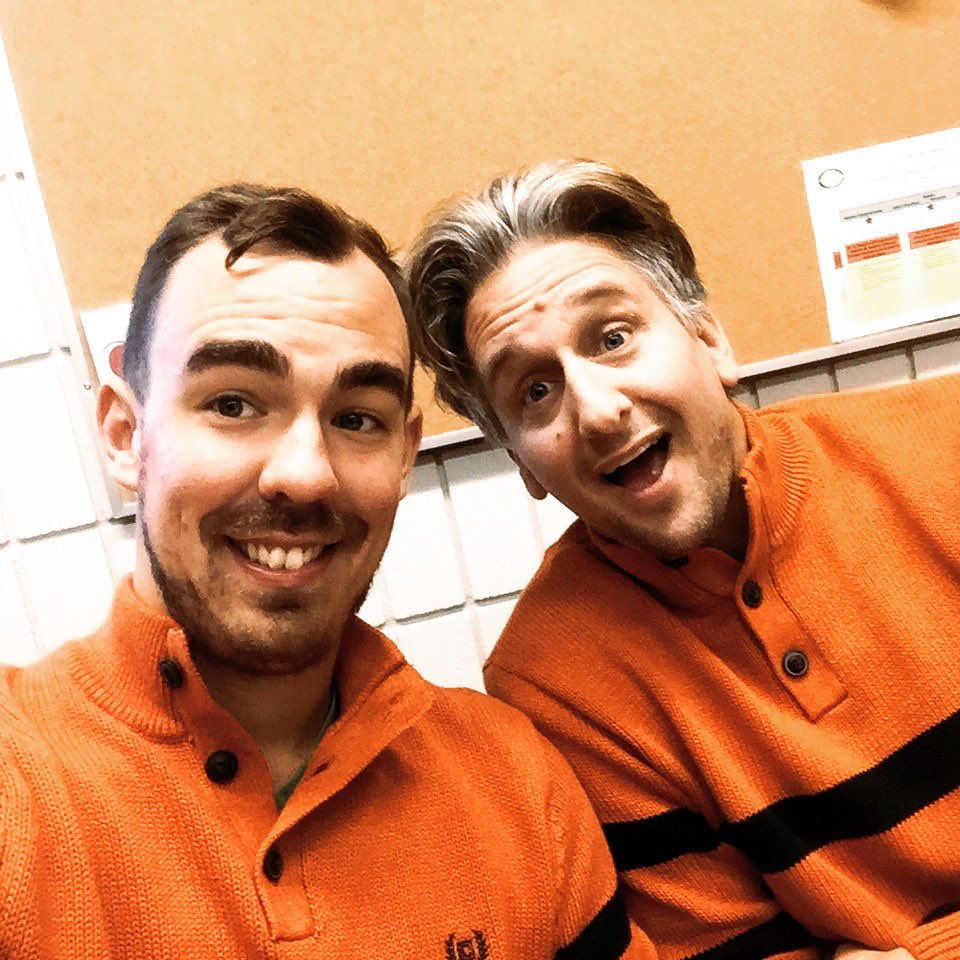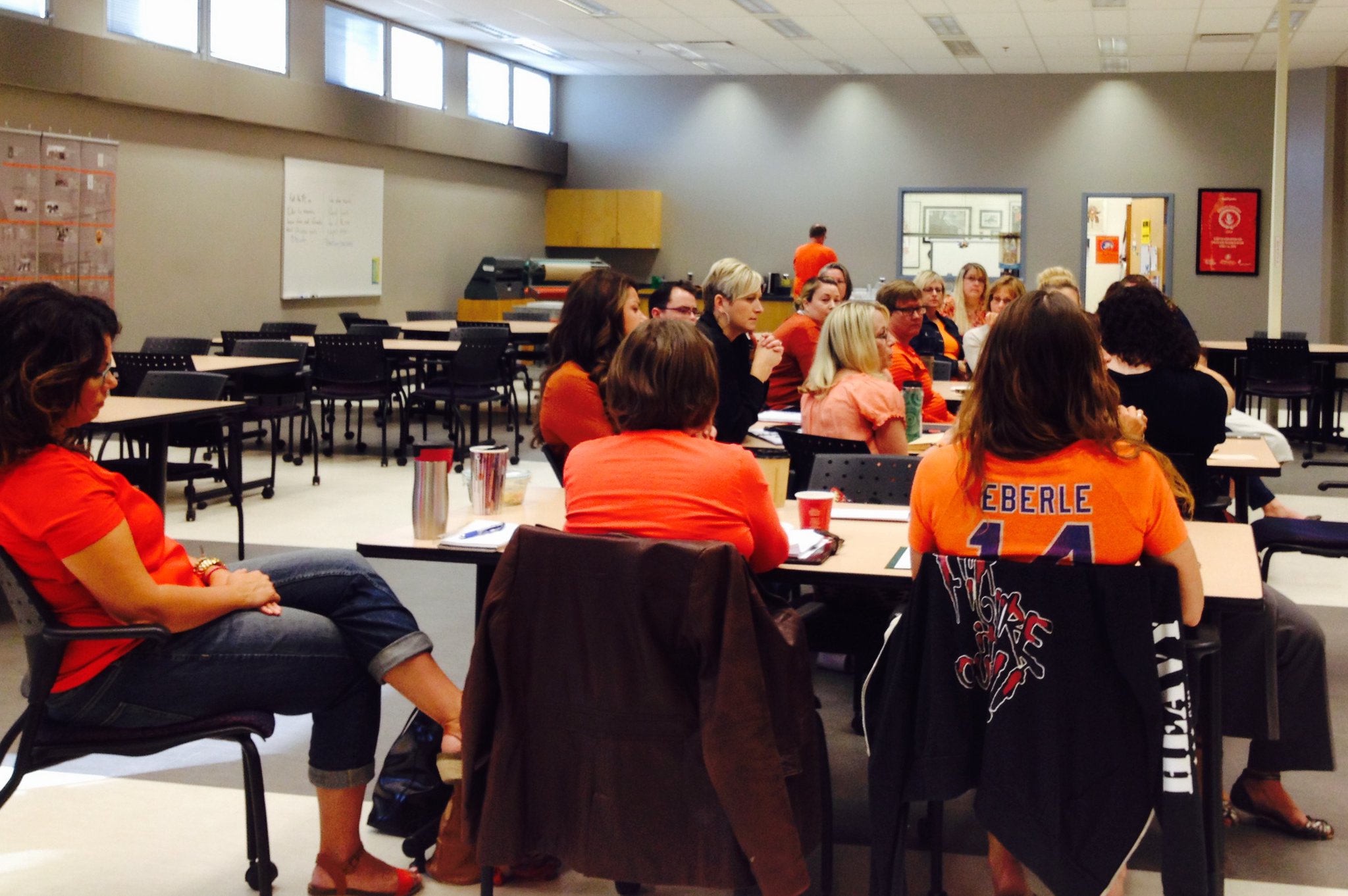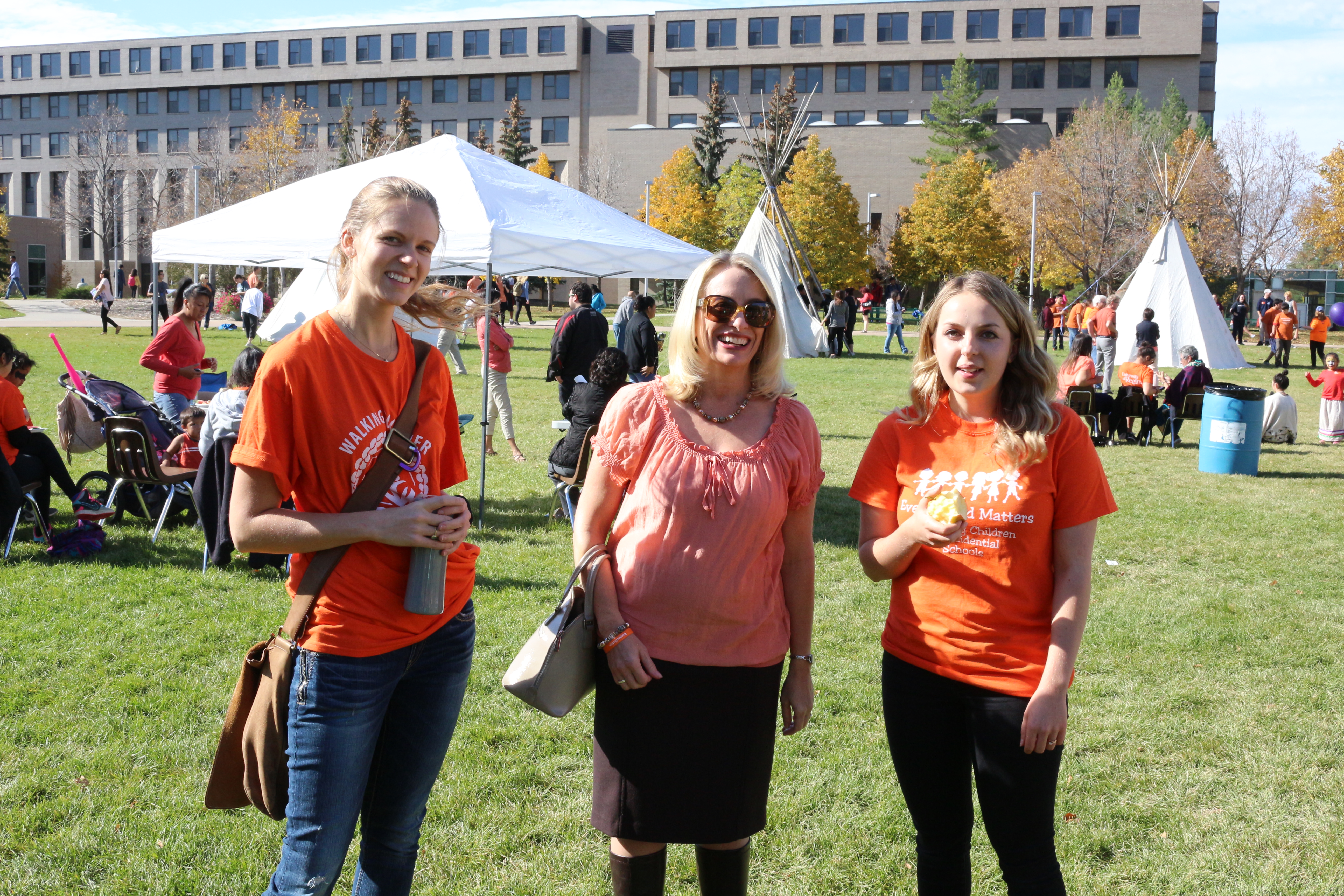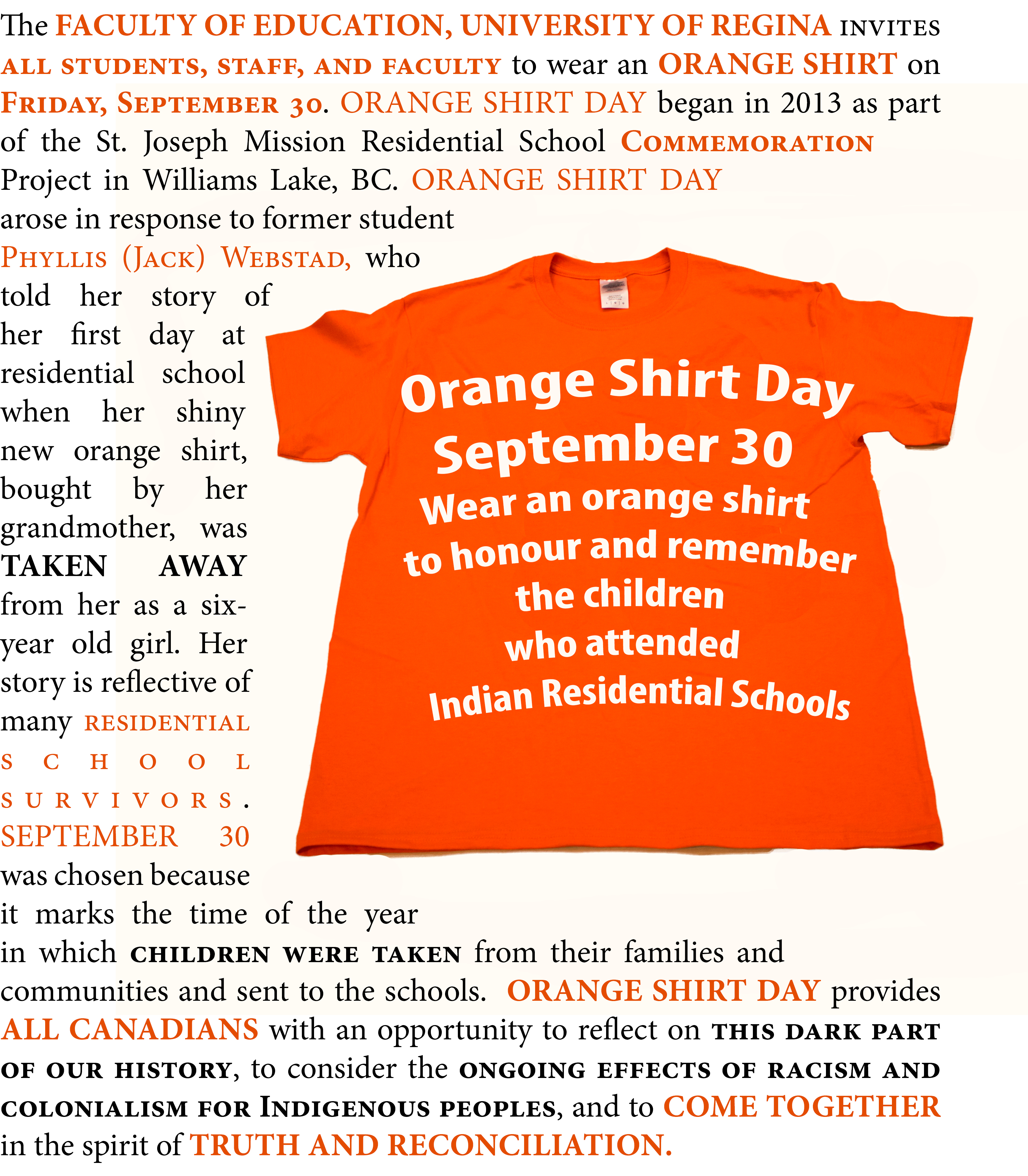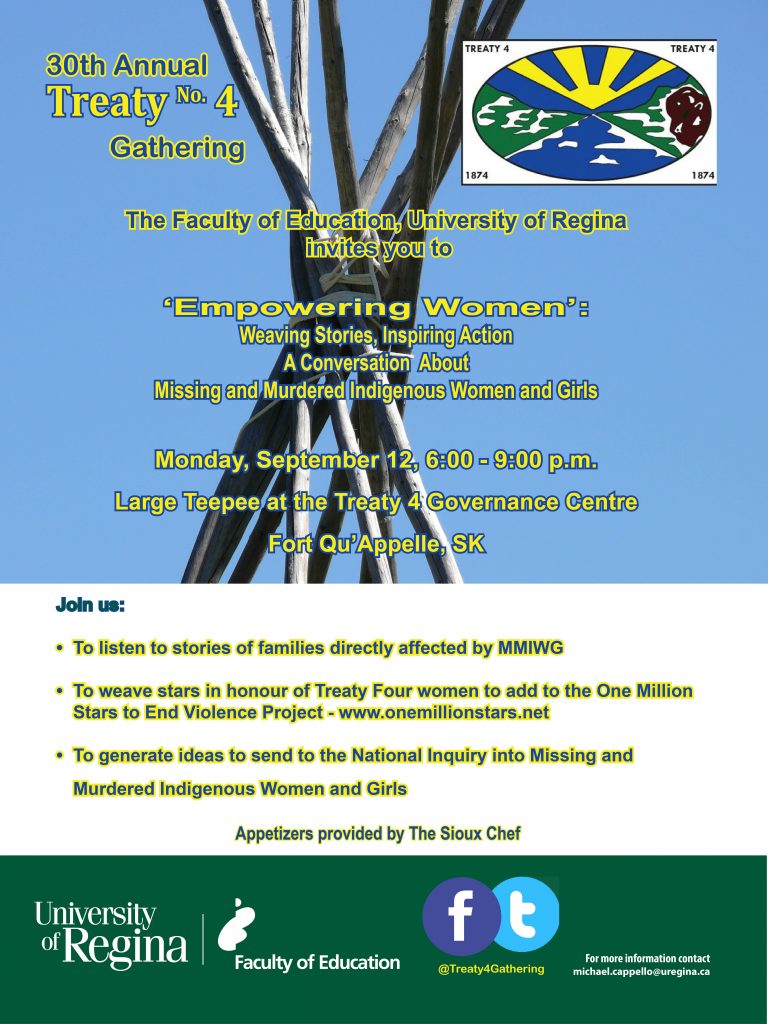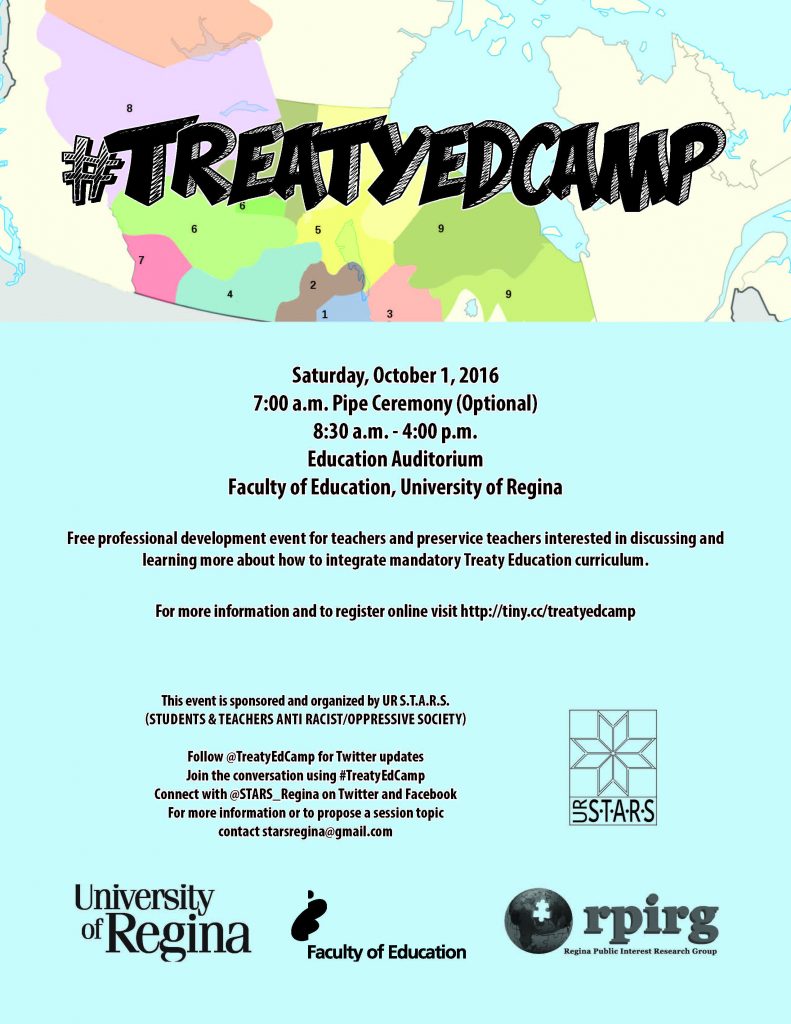Category: Events
Orange Shirt Day – September 30
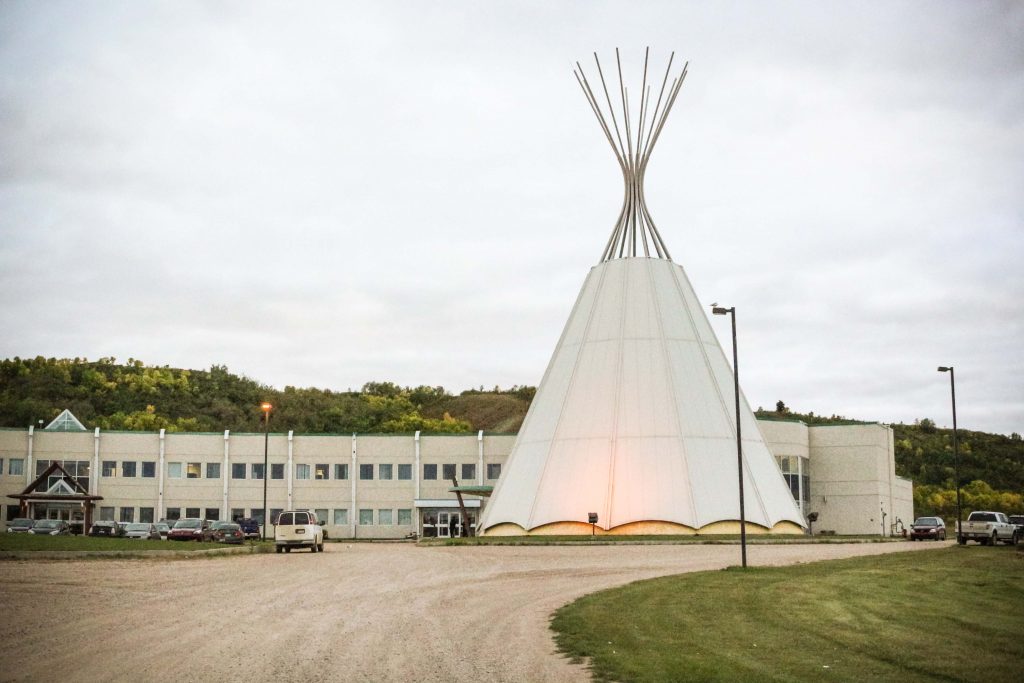
The Faculty of Education at Treaty 4 Gathering: Discussing Empowerment of Women
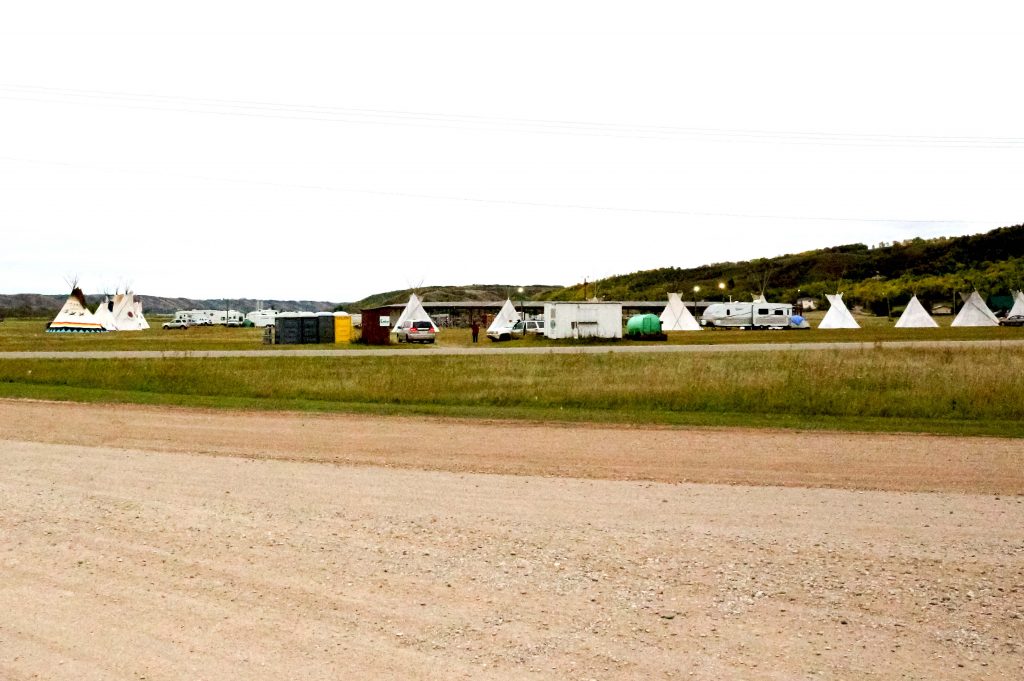
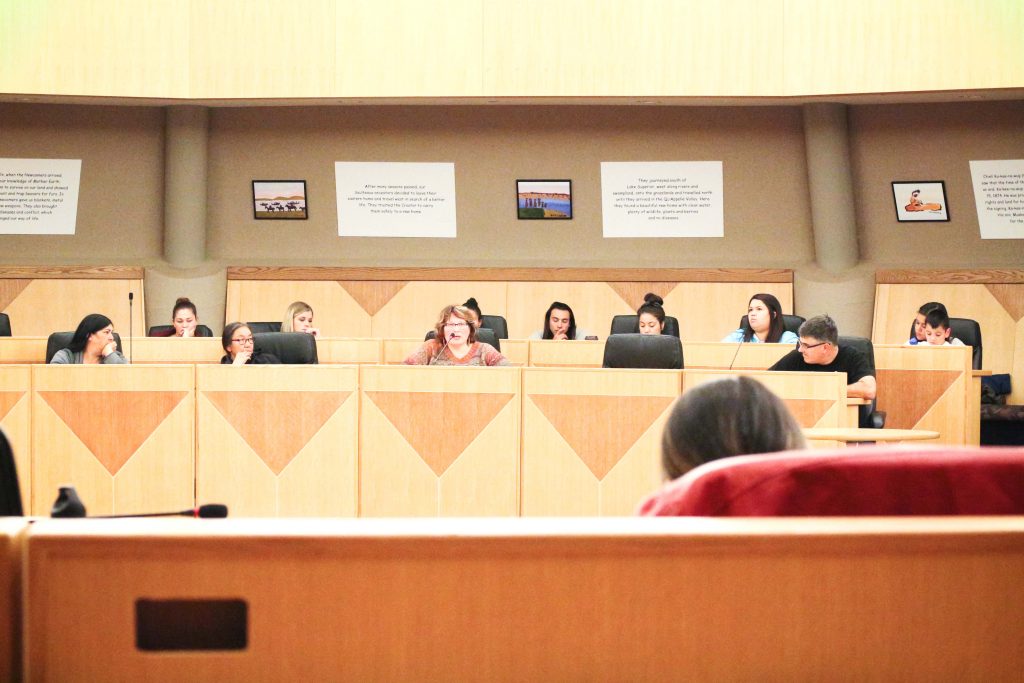
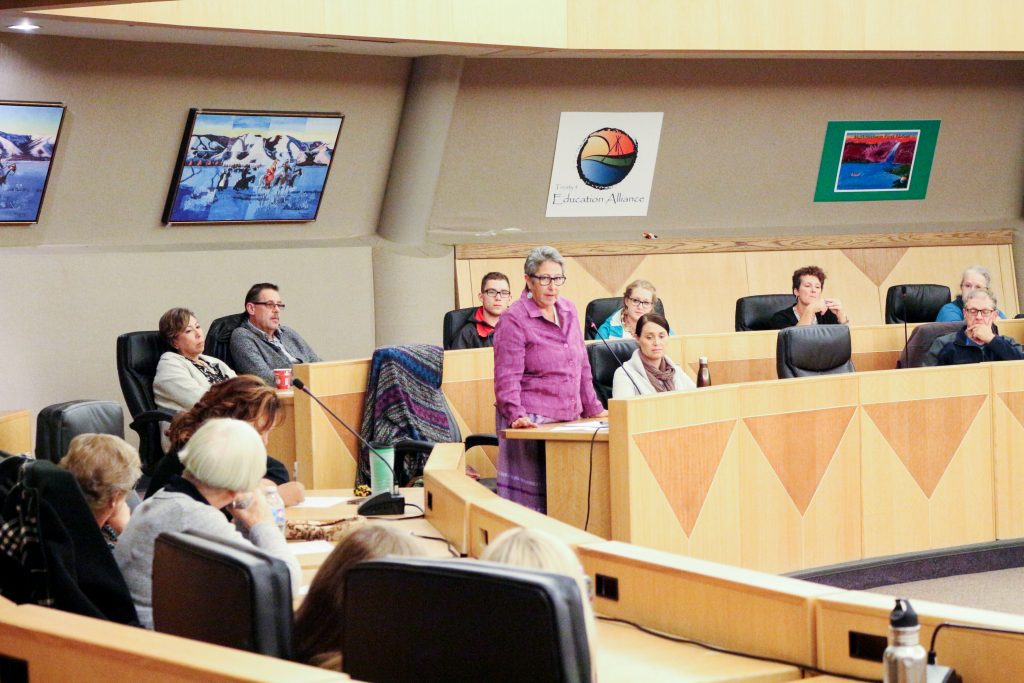
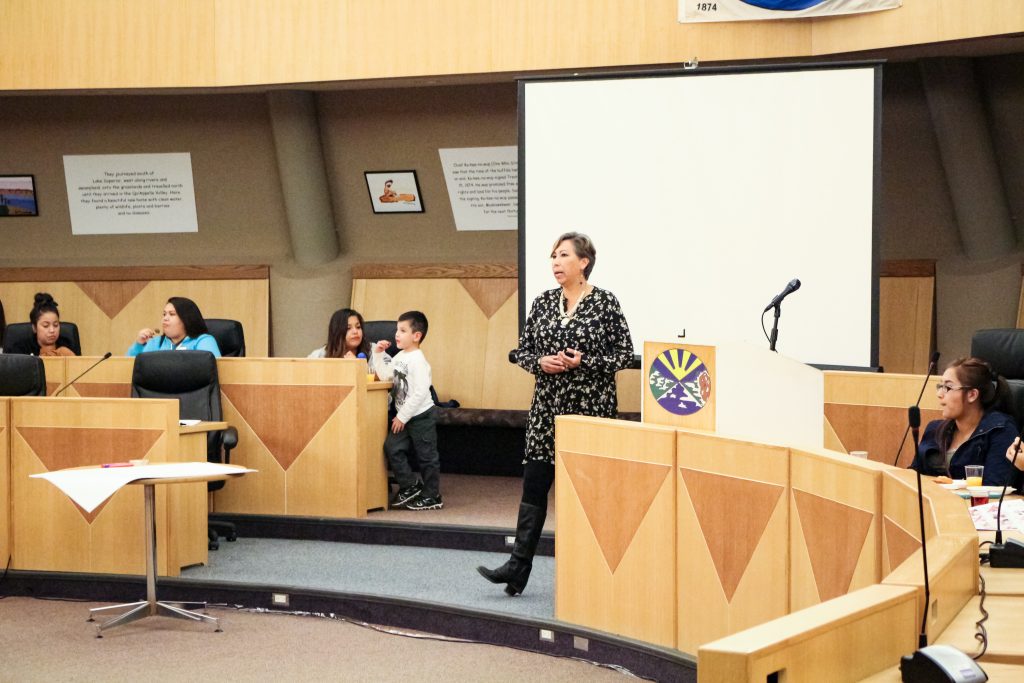
The Faculty of Education joined with the Treaty 4 Gathering at Fort Qu’Appelle on Monday, September 12.
Nearly 70 participants sat in the circle of the large tipi of the Treaty 4 Governance Center to discuss an important and emotional issue: “Empowering Women”: Weaving Stories, Inspiring Action–A Conversation about Missing and Murdered Indigenous Women and Girls.”
After Elder Alma Poitras led the meeting in prayer and smudging, Elder Brenda Dubois spoke of the importance of Kokum (a Cree word for Grandmother) in protecting communities and ensuring safety. However, she pointed out that many Kokums are now raising several children who have been left behind by their parents. The need is greater than can be addressed by Kokums only.
Elder Dubois emphasized the need to “re-dress” not just address the issue of missing and murdered Indigenous women; the discussion has gone on long enough–solutions are needed and reparations must be made. She pointed out that colonists negotiated with the men only, in a time when women were the decision makers. The effects of colonization have been devastating to Indigenous women. Dubois said that Indigenous women must take back their rightful position, as must the men.
After she spoke, several women shared their stories of loss and trauma due to racial and gender discrimination. One woman spoke of the need for stories of healing, so that we can walk forward together.
Dr. Brenda Anderson then spoke on the need for professors such as herself to use their privilege to educate others to respect and honour Indigenous peoples and cultures. She expressed concern, however, about how “good” works would be done. She reminded us that many White settlers believed (and would still believe) that the residential school system was good.
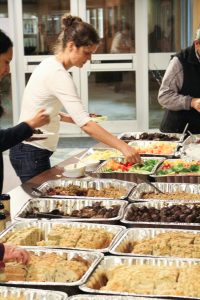 After refreshments prepared by Dickie Yuzicapi, the Sioux Chef, participants were given ribbons and instructions for creating a star, as part of the One Million Stars project by Maryann Talia Pau an Australia-based, Samoan Super Weaver. She says, the hand woven stars “are symbols of light, courage and solidarity to end all forms of violence, including violence against women, bullying and racism.”
After refreshments prepared by Dickie Yuzicapi, the Sioux Chef, participants were given ribbons and instructions for creating a star, as part of the One Million Stars project by Maryann Talia Pau an Australia-based, Samoan Super Weaver. She says, the hand woven stars “are symbols of light, courage and solidarity to end all forms of violence, including violence against women, bullying and racism.”
Dr. Shauneen Pete took up the challenge to move the discussion to action. She generated discussion in a brainstorming session about two key questions: What are the concrete issues that the National Inquiry into Missing and Murdered Indigenous Women and Girls must address for it to be successful?; and, Given your personal/professional position, what are the concrete actions that you can take to make our communities safer for Indigenous Women and Girls? Many suggestions were offered including ensuring the RCMP are accountable, teaching about safety, ensuring there is no ban on cold cases, ensuring support through the justice system process, and most importantly, when attempting to redress the issue, paying attention—listening—to the families and communities who have been affected by the loss of a beloved woman or girl. This was a major theme throughout the discussion. The answers should come from Indigenous communities, from those most impacted.
Organizer and moderator, Dr. Michael Cappello said that what he took home was the importance of centering the voices of families affected by the trauma of missing and murdered loved ones. Dr. Cappello felt that it wasn’t an option for educators and preservice teacher educators to remain outside of this important issue. He said, “We, as White Settlers, are positioned to bear some of the weight of this issue. We, as a Faculty, can create spaces—through policy, values, language, and intention—for Indigenous ways and culture to be respected and honoured. We can prepare young men to go against the violence of the dominant male stereotype; we can honour women and girls, showing them how they should expect to be treated; we can teach to engage the heart in preparing teachers.”
Faculty of Education at Treaty 4 Gathering
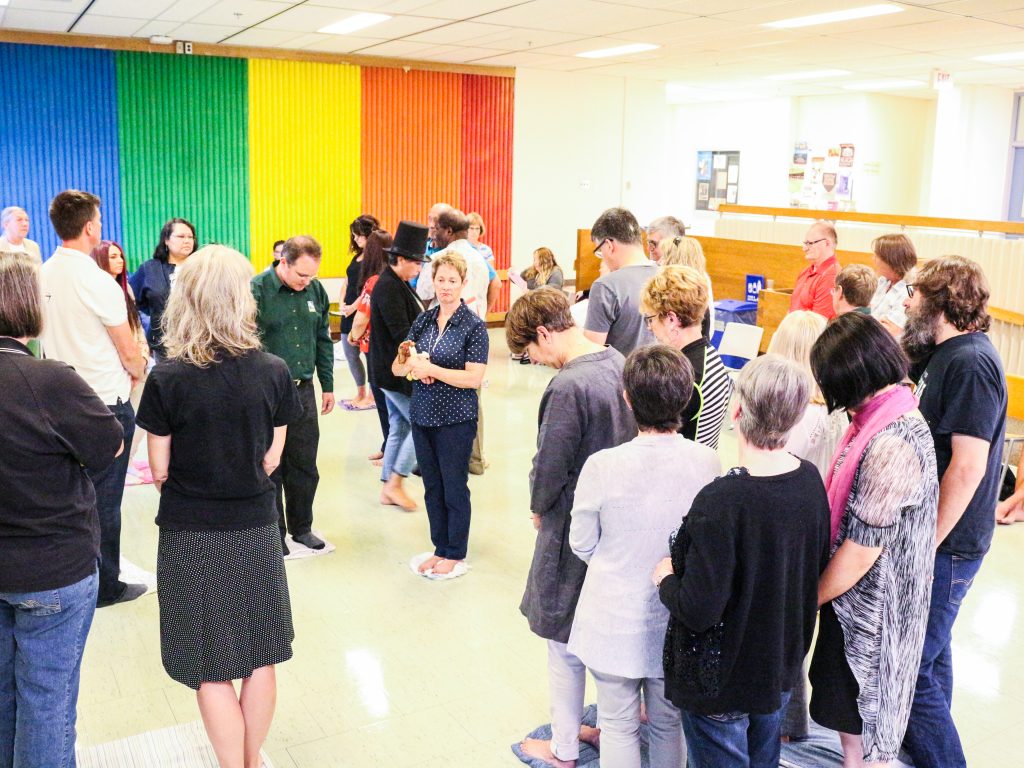
Fall Faculty Seminar – Starting the Academic Year in a Good Way
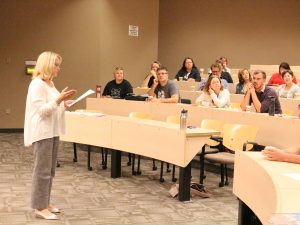
The faculty and staff of the Faculty of Education came together on August 29 for their Annual Fall Faculty Seminar. New faculty and staff were introduced and the past year’s achievements were recognized and celebrated.
One fun tradition in the Faculty is the “Dead Balloon Award,” which is awarded to faculty who achieve their Ph.D. This year’s recipients are Dr. Christine Massing, Dr. Jenn De Lugt, and Dr. Gale Russell. They will share this award, but they won’t hold on to it long, since new faculty Sara Schroeder, Heather Phipps and Jöel Thibeault are close to their defence dates.
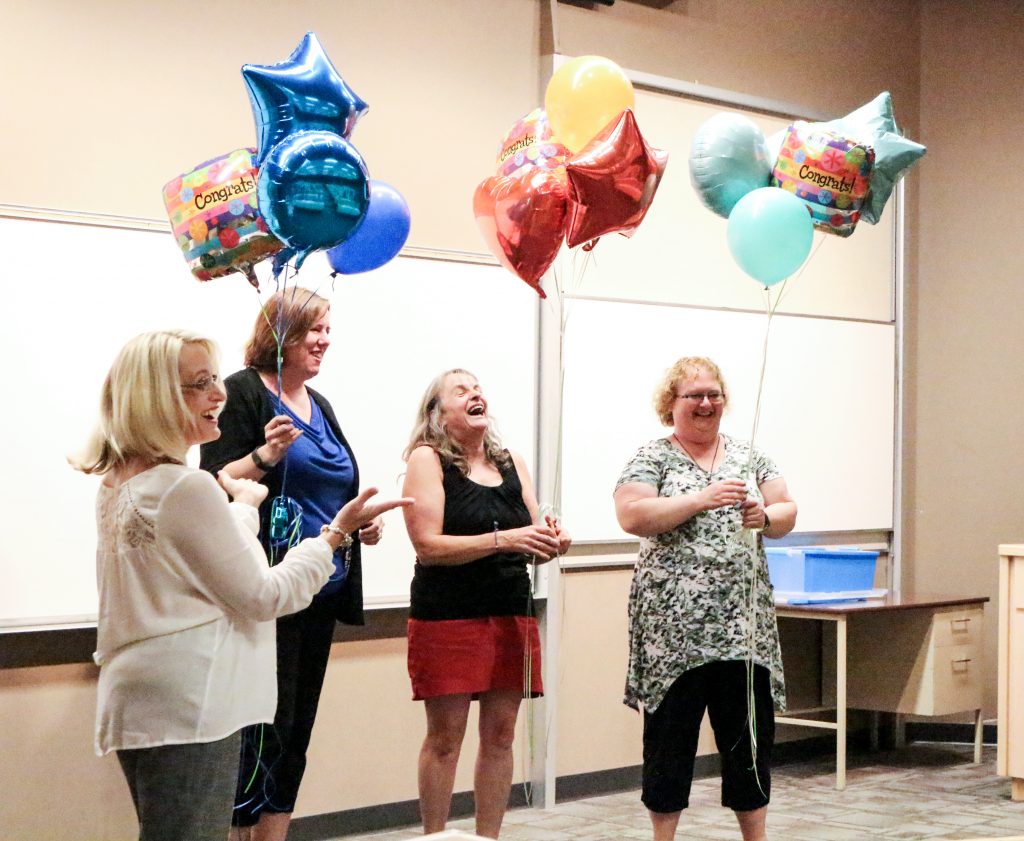
The morning also included the Blanket Exercise, which began with a prayer by Elder Noel Starblanket. Dr. Michael Cappello was the Narrator, a UR S.T.A.R.S. representative assisted with the exercise, and Dr. Shauneen Pete played the role of the European.
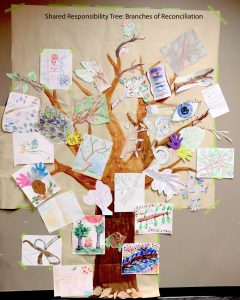
After the Blanket Exercise, faculty and staff had opportunity to express their thoughts and emotions regarding the exercise and the Calls to Action from the National Centre for Truth and Reconciliation. Dr. Jolee Sasakamoose led the group in an Indigenous Expressive Art Therapy activity, which is a therapeutic and reconciliatory approach that has developed in response to the groundwork laid by the First Nations communities within Saskatchewan and through the spiritual guidance engaged with ceremonial practices and protocols.
After lunch, the faculty and staff enjoyed an afternoon of golf followed by a BBQ. (Below is a photo gallery of the day. Slide your cursor over the photo and click on the arrow to see the next photo)
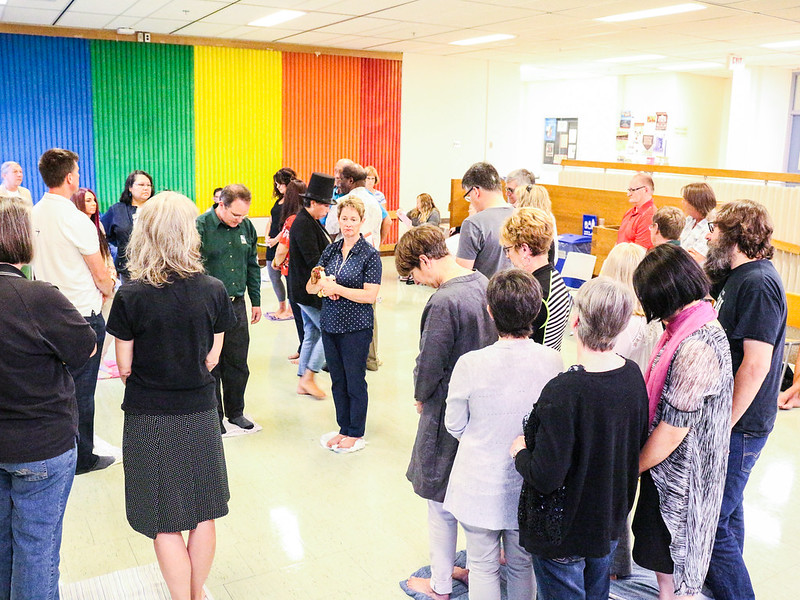
>
#TreatyEdCamp 2016
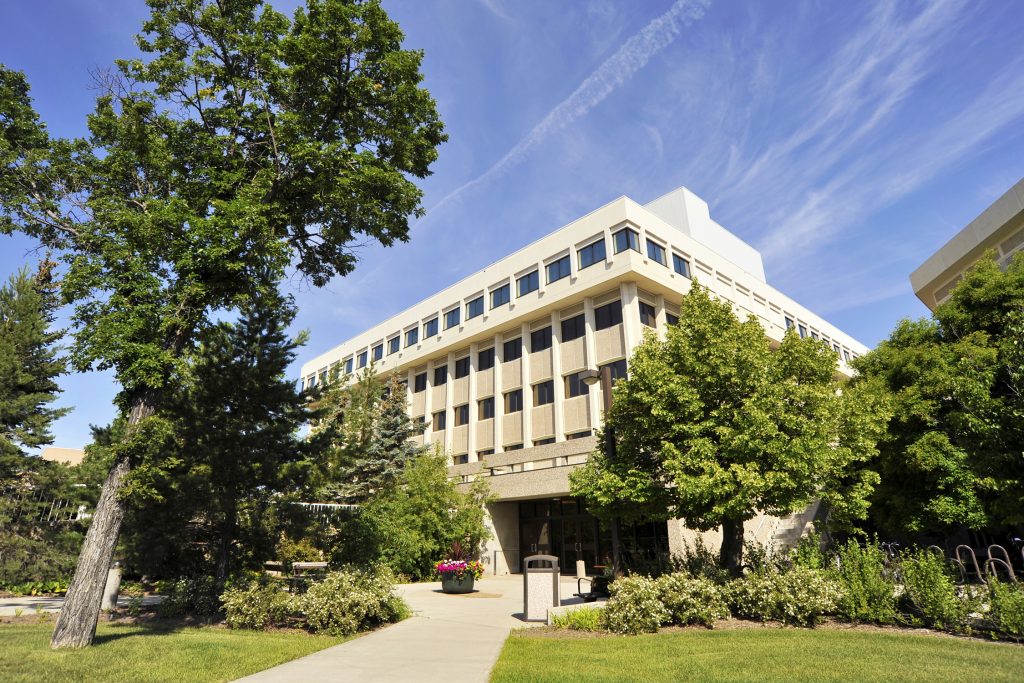
The Faculty of Education invites students, faculty, administration, and staff to a
UR Welcome Back
Faculty of Education Graduate Student Social
Friday, September 9, 2016
5:00 – 7:00 p.m.
2ND Floor Mezzanine, Westside of Education Building
(Closest to Exit from the EdGrad Office)
This is an informal gathering for graduate students in education, including those just beginning their program and those closer to completion. The aim is to provide an opportunity for graduate students to foster collegial relationships both with one another and with those who support them in their studies. The event is also intended to recognize and celebrate the hard work involved in pursuing and successfully completing a graduate program. Please see details below and in the attached invitation.
Food and Refreshments provided
(One complimentary alcoholic drink per person)
RSVP to angela.kampert@uregina.ca by Friday, September 2, 2016
Staff Appreciation Week in the Faculty of Education
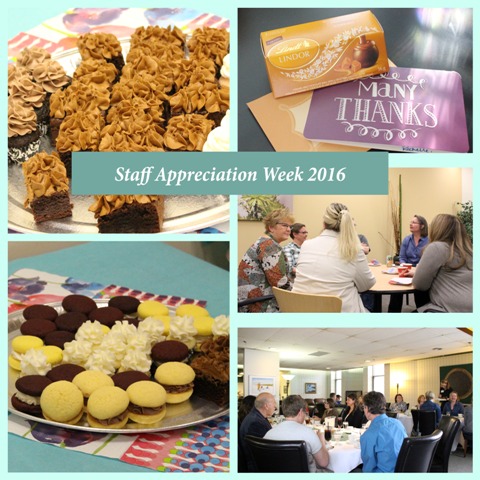 This week was made special for staff who shared a lunch at the University Club, received a visit at their offices by Dean Jennifer Tupper and General Administrator, Rochelle Fenwick (who gifted staff with chocolate treats and thank you cards), and had opportunity to visit over a coffee break with assorted cakes; all efforts of the administration to let staff know how much they are valued and appreciated.
This week was made special for staff who shared a lunch at the University Club, received a visit at their offices by Dean Jennifer Tupper and General Administrator, Rochelle Fenwick (who gifted staff with chocolate treats and thank you cards), and had opportunity to visit over a coffee break with assorted cakes; all efforts of the administration to let staff know how much they are valued and appreciated.
Anthropology of the Discard: An Interactive Exhibition
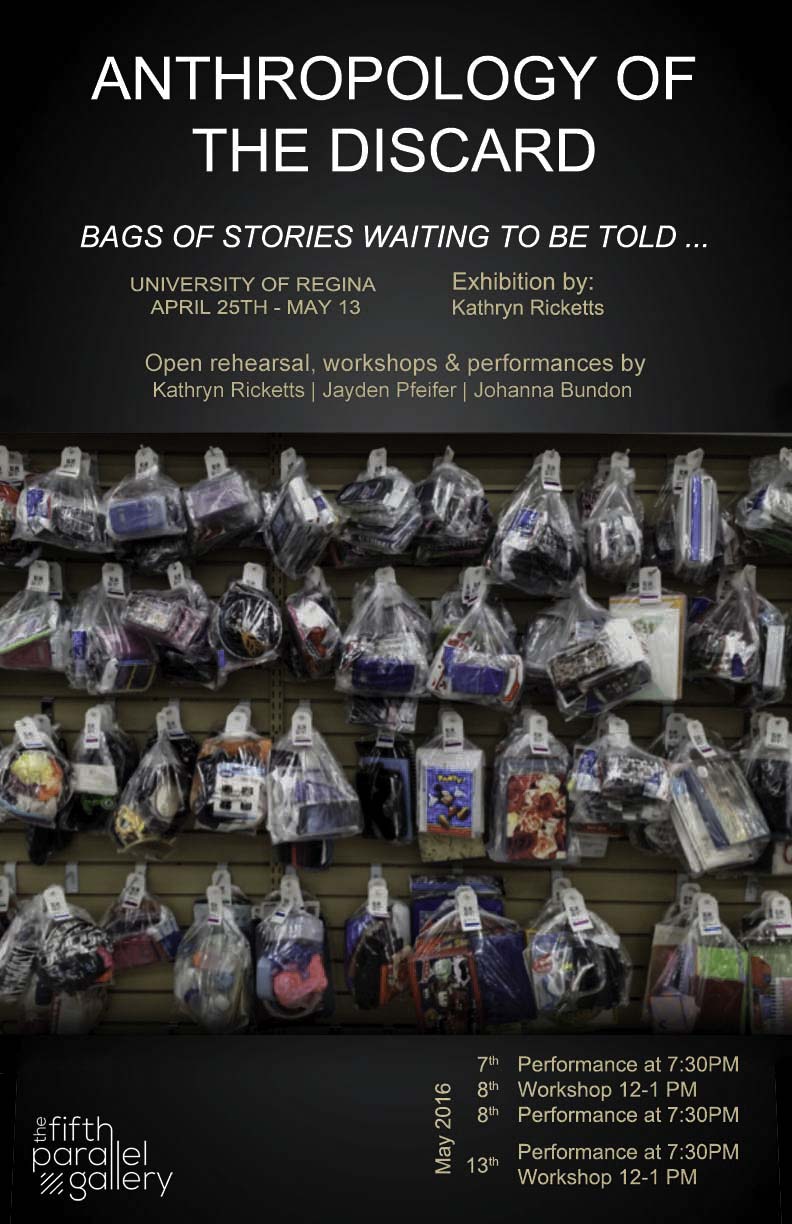 “Anthropology of the Discard” is an interactive exhibition illuminating the saliency of objects as triggers for performative storytelling. It is also a display of artifacts as emblems of lives lived, and lives that refuse to be seen in isolation of each other. Fascinated by the wall of Value Village where conglomerates of objects hang in plastic bags for the standard price of $2.99, Dr. Kathryn Ricketts has collected those that are ‘bulging’ with compelling possible new narratives.
“Anthropology of the Discard” is an interactive exhibition illuminating the saliency of objects as triggers for performative storytelling. It is also a display of artifacts as emblems of lives lived, and lives that refuse to be seen in isolation of each other. Fascinated by the wall of Value Village where conglomerates of objects hang in plastic bags for the standard price of $2.99, Dr. Kathryn Ricketts has collected those that are ‘bulging’ with compelling possible new narratives.
Grad student Jayden Pfeifer and dancer Johanna Bundon have been experimenting along with Kathryn Ricketts for several months around these concepts. Join them in a performative exhibition in April/May at The Fifth Parallel, (U of R, Riddell Centre) where they are excited to share their deepened understanding of the power of objects.
The audience is invited to construct their own bulging bag of stories (ongoing). Bags and objects will be available in the gallery or participants can bring their own constructed bag of objects from home.
Watch an open rehearsal to see how the performed stories are constructed (Posted at Gallery). Watch a 30 min performance of a bulging bag of evocative objects (May 7, 8 & 12th, 7:30 PM). Take in a workshop to learn how to create performative narratives from discarded objects. (May 7 & 8th 12 – 1 PM)
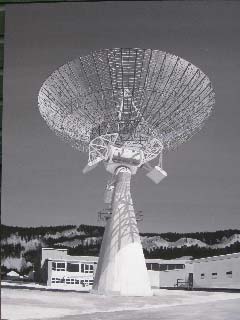
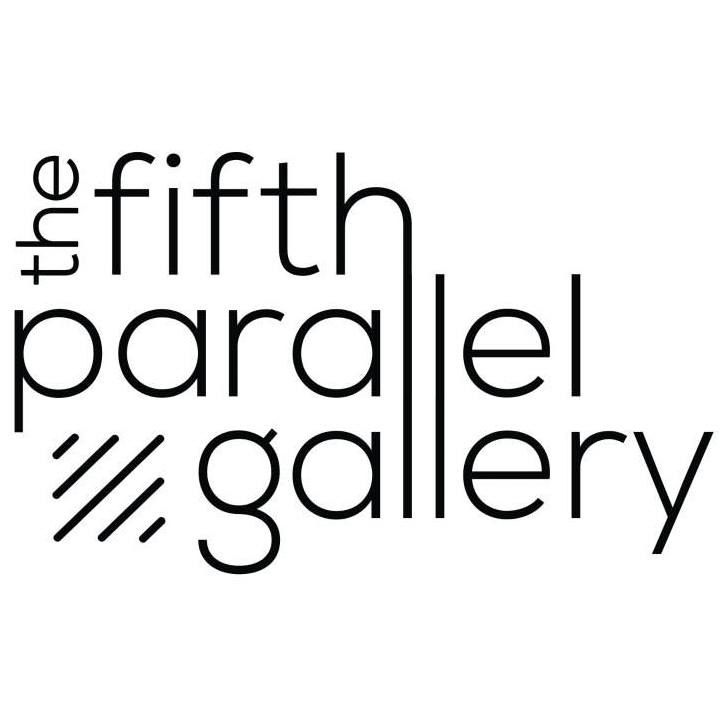
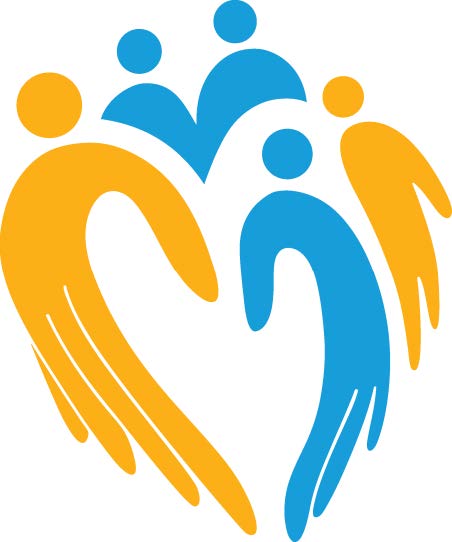
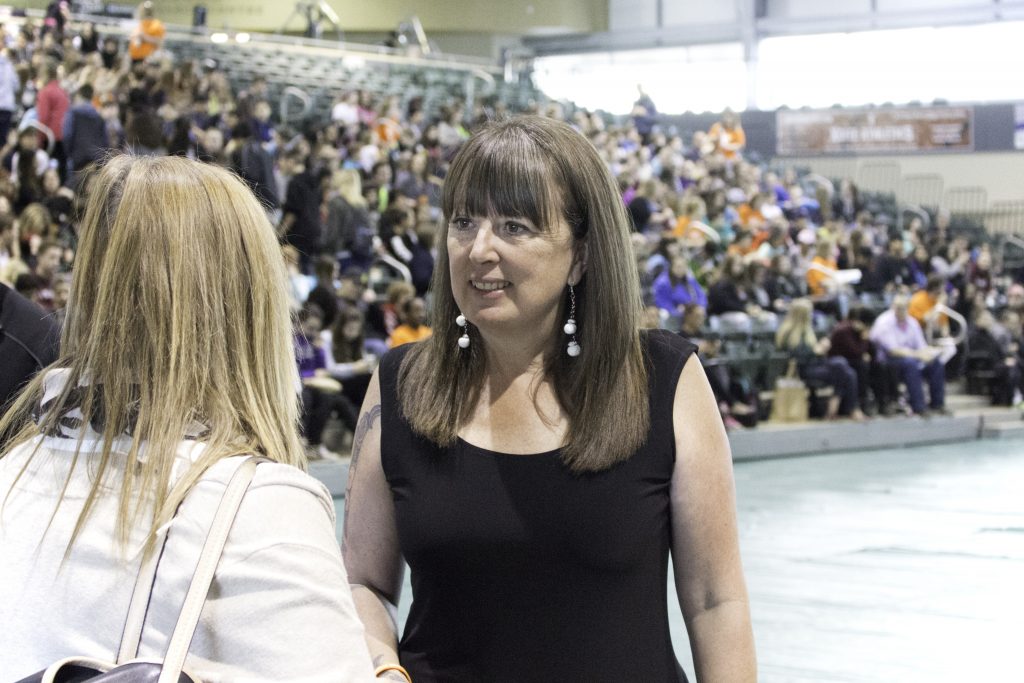
“Walking Together”: A Day of Education for Reconciliation
On April 14, the Faculty of Education, in partnership with the National Centre for Truth and Reconciliation (NCTR) hosted “Walking Together”: A Day of Education for Reconciliation for 1447 students (Grades 5 – 12) and 103 teachers from approximately 50 schools across Saskatchewan. Dean Jennifer Tupper says, “The numbers far exceeded our expectations and are indicative of our larger commitment to Indigenization and the history and legacy of residential schools in our province.” Participants learned about the history of residential schools, their impact, and about how to move forward, “Walking Together,” the theme chosen for the event.
Committee members brought together a meaningful schedule of activities in which students and teachers participated. The day began in a good way with a smudging ceremony for committee members and volunteers led by Life Speaker Noel Starblanket.
The opening included greetings from Dean Jennifer Tupper, Life Speaker Noel Starblanket, Indigenization Lead Shauneen Pete, Education Lead for the National Centre for Truth and Reconciliation Charlene Bearhead, and President Vianne Timmons who engaged the students with calls for a responsive “I will” regarding their commitment to participation. Eugene Arcand, a residential school survivor who served on the Truth and Reconciliation Commission Survivor Committee, asked survivors to stand and come forward so they could be recognized and honoured. Indigenous drumming and singing reminded participants to remember those who have gone before them. Elder Alma Poitras explains that “drums are more than the heartbeat of mother earth. They are our ancestors reminding of where we come from. Each tribe has their own identity, but for me when I hear the drums I am reminded by our ancestors and by Nature to respect what has been provided.”
An interesting and inspirational day of workshops and presentations included education student- and faculty-led blanket exercises, in English and French. The Blanket Exercise is an interactive learning experience that teaches the history of colonialism experienced by Indigenous peoples, physically and visually demonstrating the losses endured by Indigenous peoples: land, language, and loved ones due to epidemics and illness, and children lost to residential schools; all of which highlight the effects of broken treaty promises. Other workshops for the day included: “Truth and Reconciliation Through Music” with Brad Bellegarde, “Playback Theatre” with Dustin Brass, Ben Ironside, and Erin Goodpipe; “Le Fil de Reconciliation” with Anne Brochu Lambert, the Prairie South School Division brought their student presentation “Voices of Youth” with Vivian Gauvin; “Métis Experience” with Russell Fayant and Brenna Pacholko; a “Conversation for Reconciliation” with Lee Prosper; “Inuit Reflection and Vision” with Elder Millie Anderson; “Project of Heart” with Sylvia Smith; “If These Hills Could Talk” with Daya Madhur and Noel Starblanket, and “This is Not Sacred” with Eagleclaw Thom (in which students created hide paintings using silk-screen materials and modern digital technology.)
The day closed with presentations from the NCTR Imagine Canada winner, Christopher Sanford Beck, and representatives from All Nations Healing and the RIIS Media Project. Dr. James Daschuk challenged the group to action: In accordance with Call to Action #75, which calls upon the federal government to work with provincial, territorial, and municipal governments, organizations, and landowners to develop and implement strategies for ongoing identification, documentation, maintenance, commemoration, and protection of residential school cemeteries or other sites where residential school children were buried. Participants were challenged to send a postcard to the House of Commons and the Office of the Prime Minister to ensure the Regina Indian Industrial School (RIIS) cemetery is given heritage status, and the site commemorated and memorialized. Resulting from these actions, alongside the important work of organizations such as the RIIS Commemorative Association Inc. and the Luther College’s recent Project of Heart, on September 26, the Regina City Council approved heritage status for the RIIS cemetery.
Photo Gallery (Slide cursor over the photo and click on the arrow to see the next photo) 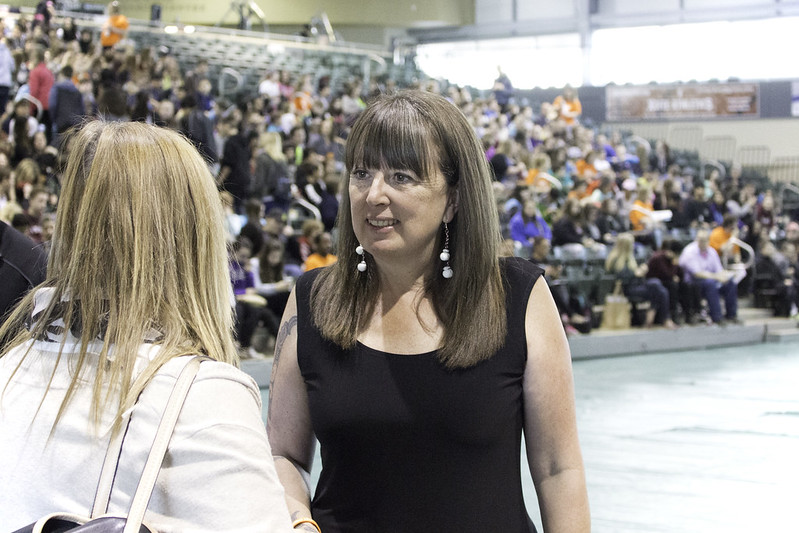
Interview with NCTR Education Lead Charlene Bearhead
Charlene Bearhead, Education Lead with the National Centre for Truth and Reconciliation (NCTR), worked closely with the Faculty of Education in every aspect of the planning and budgeting for the Day of Education. She hopes to “see a Day of Education at every Faculty of Education across the country.” The following is an interview with Charlene Bearhead.
Describe your role as Education Lead with the NCTR?
I am responsible for the engagement of Ministries of Education, School Divisions, Faculties of Education, School Board Associations, Teachers’ Organizations and all other education organizations and agencies across Canada. This includes public education and outreach towards our goal of educating every person living in Canada about the history and legacy of Indian Residential Schools and to engage Canadians in meaningful reconciliation.
How did this partnership between the U of R and NCTR come about?
I have been connected with the Faculty of Education at the University of Regina (U of R) for some time through my work as the National Coordinator of Project of Heart. The Faculty of Education at the U of R is such a natural fit for a partnership with NCTR for so many reasons not the least of which is the incredible and authentic commitment, leadership, and action on addressing the voids in education in the areas of all that is Indigenous in such a genuine and respectful manner.
How many Days of Education has NCTR jointly hosted?
The Truth and Reconciliation Commission hosted six Education Days within its National Events and NCTR hosted one in Winnipeg for the official opening of the Centre on November 4, 2015.
What was unique about the “Walking Together: A Day of Education for Truth and Reconciliation at the U of R?
It was the first one ever to be hosted by a University. The overwhelming success of the U of R day has inspired the University of Manitoba (U of M) Faculty of Education and the Faculty of Education at University of Prince Edward Island (UPEI) to host their own events this fall.
Why are Days of Education for Reconciliation important?
These days of education give the unique opportunity for students and teachers to come together to experience learning with one another, to engage in authentic learning experiences that might not be otherwise available in their own schools and communities, and to understand that they are a part of something much bigger than an individual school or community. It gives students and teachers the opportunity to garner ideas and experience learning that they can then take back and share in their home schools to promote the seeking of truth and reconciliation in their families and communities.
You’ve been known to use the word “ReconciliACTION.” What is the passion behind this word for you?
The term “ReconciliACTION” was coined by Stan Wesley who is an amazing and inspiring Anishnabe mentor from Ontario. I love the term because it embodies the understanding that if we don’t actually take action on our learning nothing will change. I’ve borrowed the term from Stan with his blessing as have many others across the country.
What outcomes have you seen resulting from these Days of Education? And specifically the U of R?
The positive action and energy that have resulted from these Education Days is endless. The most important outcome is that they inspire people in other parts of the country to host their own gatherings of authentic, experiential learning and ReconciliACTION. The U of R day has inspired the U of M and UPEI among others.
There will be many more truth and reconciliation days of education at Faculties of Education across the country as a result of April 14, 2016 at the U of R. In fact I have had a call from the North Dakota State University in Fargo, ND, as a direct result of the U of R education day media coverage.
What does Reconciliation Mean to You?
School Children’s Responses After a Day of Education for Truth and Reconciliation
“Reconciliation means a promise.” Ashton Boyd
“Revering a culture.” Zander
“Learning about First Nations past, and being courageous to make a difference.” Jasmine Mcrae
“Treating everyone equal.” Peter
“No one is judged by what they wear or what colour skin they have.” Abby Larsen
“Treat others the way you want to be treated.” Nhicole Padora
“Equality no matter what your culture is.” Mia Sander
“Treating other people fairly.” Alliyah Lara
“Change the world.” Lauryn Towers
“Make sure everyone fits in together.” Preslyn Wilson
“Treating everyone equal.” Breanna K.
“Stop hurting other people’s feelings.” Cole
Colours just a colour; it doesn’t define who you are.” Alyssa
“Everybody can be equal; no one should be left out.” Merissa Tomaschefski
“Everyone to have equal rights.” Sasha Romanow
“Stop racism: Where I see it, I will stand up to it.” Zia Knox
“Accept everyone has culture; they be themselves.” Himashi Gunasinghe
“Love people for who they are.” Hailey Johnson
“Change past -> better future.” Mackenzie Sheane
“Right the wrongs.” Malena Jensen
